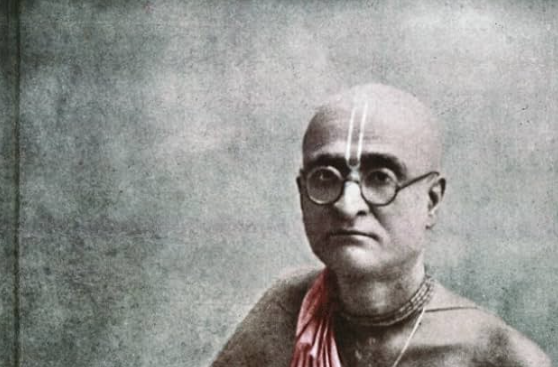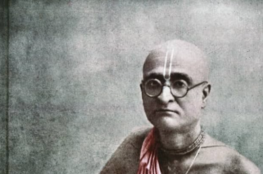By Sri Bhaktisiddhanta Saraswati Goswami Prabhupada
The first act of new-born infant Krishna recorded by the Bhagavatam is the slaying of the demoness Putana. The demoness Putana was deputed by King Kansa to kill all the newborn babies of the realm of Braja where he was informed by the Divine sage Narada that his would-be slayer had been recently born.
Meanwhile Shree Krishna had been born in Kansa’s prison and had been conveyed by His father Vasudeb to the house of His foster parents Nanda and Yasoda in Braja during the night of His advent. The guards of the prison had failed to detect the movements of Vasudeb who had returned to his prison with the new-born daughter of Yasoda with whom he had exchanged His own Boy without the knowledge of Yasoda herself.
Vasudeb had carried Krishna in his arms across the flooded Yamuna lashed into fury by the tempestuous water of that moon-less night. He had waded on foot in the deep waters which had been turned into yawning whirlpools by the fury of the tempest. The iron chains, bolts and locks of the barred gates of the prison had opened of their own accord on the approach of Vasudeb carrying Krishna to the home of His foster parents.
The daughter of Yasoda was thereupon duly reported to King Kansa as the new-born, dreaded eighth issue of Devaki. The King rushed into the prison-cell on receipt of the tidings for which he had been waiting through long years of sleepless nights.
He was at first willing to spare the life of the baby as the prophecy was to the effect that he would be killed by a male child, eighth issue of Vasudev and Devaki. But he thought of being relieved of all possible doubts on the point by putting to death the new-born girl.
As, however, King Kansa was on the point of dashing the baby on the block she escaped from the grip of the King and disclosing herself as Mahamaya the Deluding Energy of Godhead, as she remained visible for a short time in mid-sky, assured the King of the certainty of the birth of his future slayer but dissuading him form the fruitless attempt of avoiding his fate by the cruel murder of innocent infants. Saying this Mahamaya disappeared from the view of the astounded King.
Kansa was subsequently informed by the sage Narada that his future slayer must have been born among the denizens of Braja and that he was mindful of his safety he should lose no time in taking drastic measures for nipping the danger in the bud. This advice was relished by the blood-thirsty coward and he has accordingly deputed the demoness Putana to kill, by an unsuspected process, all the new-born infants of the surrounding country.
The demoness Putana accordingly made her appearance in Braja and presented herself in the home of Yasoda during the absence of Nanda, who was then in Mathura to pay the tribute due from him to King Kansa. The demoness has assumed the form of a most beautiful matron with a most benignant aspect as she approached the couch where Infant Krishna had been put to sleep by Yasoda.
Yasoda noticed the unknown female as she entered the house, but did not suspect any foul play. She accordingly watched the new-comer without any anxiety as she made her way to the couch of the Baby, took Him up in her arms, and offered her breast to the Infant to give Him to suck.
But the nipples of Putana’s breast has been tipped with the deadliest poison. The infant Krishna was aware of the intention of the demoness and took hold of the breast of the monster with His supple Arms. The grip of the infant was so terribly severe that it was enough to drive the demoness to despair of her life as she was convulsed by the mortal agony of the pressure of Krishna’s little Hands. The infant then applied His lips to the breast of Putana and sucked away her life in an instant.
The terrible monster bellowing with pain was compelled to disclose her own huge, loathsome, demoniac form as she fell lifeless on the ground, covering with her hideous carcass a long distance, with Infant Krishna still clinging to her poisoned nipples.
Accordingly the first act of the milkmaids, who with Yasoda rushed to the spot, was to snatch the infant Krishna from the breast of the terrible demoness. Then they all marveled how the Baby could escape unhurt from the clutches of the demoness. They attributed the safety of the infant to the mercy of the gods who are especially kind to the helpless. The affrighted milkmaids invoked the help of all the gods and goddesses for their continued protection of the Infant.
Meanwhile, Putana was saved by her service to Krishna for having offered Him the suck of her poisoned breast. The author of the Bhagavatam is careful to mention that the good fortune of the demoness equaled that of Yasoda in as much as her breast had been sucked by Krishna. Putana, therefore, attained to the eternal status of the foster-mothers of the Supreme Lord in the Realm of the Absolute.
The above narrative of the Bhagavatam embodies a most important moral for the seekers of the Absolute. But before offering the interpretations of the texts favored by the former Acharyas I would like to draw the attention of the reader to certain possible misconceptions regarding the nature of the interpretations about to be offered.
There is a class of persons who insist on the texts being taken in their literal worldly sense. Much ingenuity has been expended for extracting meanings that may be satisfactory to the empiric judgment of the interpreters working by this literal method. Their argument is not unintelligible. As the revealed literatures are to be regarded as containing the information of the Absolute the language should be regarded as part and parcel of the meaning of the text. From this conclusion the literal interpreters jump to the wrong inference that it should be possible for the conditioned soul to ascertain the real meaning of the scriptures by sticking to the lexicographical sense of their actual wordings. This latter part of the argument is inapplicable to the subject which is transcendental. The words possess a double meaning. The lexicographic meaning refers to the entities of this world and is, therefore, inapplicable to the case. The esoteric meaning is not accessible to the gross senses and mind of the conditioned soul.
This is the great and insuperable difficulty. The literal interpreters who follow the lexicographical meaning of the words err grievously in overlooking this all-important consideration.
The transcendental meaning of the words cannot be conveyed to the senses of the conditioned soul so long as he does not agree to follow the method of submissive listening to the transcendental sound appearing on the lips of the pure devotee. There is a definite line of succession of the bonafide teachers of the truth. The bonafide teacher should be available sooner or later to the real seeker of the Truth. The bonafide Acarya is not recognizable by the hypocrites and atheists who do not really want to serve Godhead. So long therefore, as the bonafide teacher does not manifest his appearance to the pure cognitive essence of the seeker of the Absolute Truth it is necessary for the candidate for spiritual enlightenment to concentrate on self-examination to be able to avoid harboring any lurking traces of insincerity. The words of the sadhu are also available, by his causeless mercy, for bearing the efforts of such candidates, for finding out their own insincerity.
It is by overlooking or deliberately neglecting to undergo this preliminary training for obtaining access to the transcendental meaning of all words that the literal interpretationists who follow the ordinary lexicographical meaning of the words of the scriptures fail to understand the necessity of never deviating from the interpretations offered by the self-realized souls to whom the transcendental meaning of the words is available. Those empiricists who, while following the lexicographical and syntactical method of the literal interpretationists, do not scruple to read their own meanings into the texts under the impression that the scriptures and the products of the human brain liable to every form of error and, therefore, fit to be corrected by the equally erring caprices of other hypothetical thinkers on the ground of allegations of error that cannot be proved, are disposed to think that the interpretations offered by the Acharyas are not scrupulously faithful to the texts and offer allegorical explanations for supporting their own sectarian views.
These possible misunderstandings are stated to invite the attention of the reader to their bearing on the following interpretation of the narrative of Putana based on the exposition of the former Acaryas heard from the lips of the bonafide teacher of the Absolute. The interpretation is not offered as a literal lexicographical explanation nor as an allegory concocted in the light of empiric knowledge of the past history of the race and may accordingly be accepted as such.
Shree Krishna manifests His Eternal birth in the pure cognitive essence of the serving soul who is located above all mundane limitations. King Kansa is the typical aggressive empiricist. He is ever on the look-out for the Appearance of the Truth for the purpose of suppressing Him before He has time to grow up. This is no exaggeration of the real connotation of the consistent empiric position. The materialist has a natural repugnance for the transcendental. He is disposed to think that faith in the incomprehensible is the parent of dogmatism and hypocrisy under the guise of religion. He is also equally under the delusion that there is and can be no really dividing line between the material and the spiritual. He is strengthened in his delusion by the interpretation of the scriptures by persons whoa re like-minded with himself. This included all the lexicographical interpreters. The lexicographical interpretation is upheld by Kansa as the real scientific explanation of the Scriptures and one that is perfectly in keeping with his dread of an aversion of the transcendental. These lexicographical interpreters are employed by Kansa in purring down the first suspected appearance of any genuine faith in the transcendental.
King Kansa knows very well that if the faith in the transcendental is once allowed to grow it is sure to upset all his empiric prospects. There is historical ground for such misgivings.
Accordingly if the empiric domination is to be preserved intact it would be necessary not to lose a moment to put down the transcendental heresy the instant it threatens to make its appearance in right earnest. King Kansa acting on this traditional fear is never slow to take the scientific precaution of debuting empiric teachers of the scriptures backed by the resources of Dictionary and Grammar and all empiric subtleties to put down, by the show of spacious arguments based on hypothetical principles, the true interpretation of the eternal religion revealed by the scriptures. Kansa is strongly persuaded that the faith in the transcendental can be effectively put down by empiricism if prompt and decisive measures are adopted at the very outset. He attributes the failures of atheism in the past to the neglect of the adoption of such measures before the theistic fallacy has time to spread among the fanatical masses.
But Kansa is found to count without his host. When Krishna is born He is found to be able to upset all sinister designs against those who are apprised by Himself of His Advent. The apparently causeless faith displayed by persons irrespective of age, sex and condition may confound all rabid empiricists who are on principle averse to the Absolute Truth Whose Appearance is utterly incompatible with the domination of empiricism. But no adverse efforts of the empiricists, whose rule seems till then to be perfectly well-established over the minds of the deluded souls of this world, can dissuade any person from exclusively following the Truth when He actually manifests His birth in the pure cognitive essence of His soul.
Putana is the slayer of all infants. The baby, when he or she comes out of the mother’s womb, falls at once into the clutches of the pseudo-teachers of religion. These teacher are successful in forestalling the attempts of the good preceptor whose help is never sought by the atheists of this world at the baptisms of their children. This is ensured by the arrangements of all the established churches of the world. They have been successful only in supplying watchful Putanas for effecting the spiritual destruction of persons from the moment of their birth with the co-operation of their worldly parents. No human contrivance can prevent these Putanas from obtaining possession of the pulpits. This is due to the general prevalence of atheistic disposition in the people of this world. The church that has the best chance of survival in this damned world is that of atheism under the convenient guise of theism. The churches have always proved the staunchest upholders of the grossest forms of worldliness from which even the worst of non-ecclesiastical criminals are bound to recoil.
It is not from any deliberate opposition to the ordained clergy that these observations are made. The original purpose of the established churches of the world may not be always objectionable. But no stable religious arrangement for instructing the masses has yet been successful. The supreme Lord Shree Krishna Chaitanya in pursuance of the teaching of the scriptures enjoins all absence of conventionalism for the teachers of the eternal religion. It does not follow that the mechanical adoption of the unconventional life by any person will make him a fit teacher of religion. Regulation is necessary for controlling the inherent worldliness of conditioned souls. But no mechanical regulation has any value even for such a purpose. The bonafide teacher of the religion is neither any product nor the favorer of any mechanical system. In his hands no system has likewise the chance of degenerating is not a lifeless arrangement. The mere pursuit of fixed doctrines and fixed liturgies cannot hold a person to the true spirit of doctrine or liturgy.
The idea of an organized church in an intelligible form, indeed, marks the close of the living spiritual movement. The great ecclesiastical establishments are the dykes and the dams to retain the current that cannot be held by any such contrivances. They, indeed, indicate a desire on the part of the masses to exploit a spiritual movement for their own purpose. They also unmistakably indicate the end of the absolute and unconventional guidance of the bonafide spiritual teacher. The people of this world understand preventive systems, they can have no idea of the unprevented positive eternal life. Neither can there be any earthly contrivance for the permanent preservation of the life eternal on this mundane plane on the popular scale.
Those are, therefore, greatly mistaken who are disposed to look forward to the amelioration of the worldly state in any worldly sense from the worldly success of any really spiritual movement. It is these worldly expectants who become the patrons of the mischievous race of the pseudo-teachers of religion. the Putanas, whose congenial function is to stifle the theistic disposition at the very moment of its suspected appearance. But the real theistic disposition can never be stifled even by the efforts of those Putanas. The Putanas have power only over the atheists. It is a thankless but salutary task which they perform for the benefit of their willing victims.
But as soon as the theistic disposition proper makes its appearance in the pure cognitive essence of the awakened soul the Putanas are decisively silences at the very earliest stage of their encounter with new-born Krishna. The would-be slayer is herself slain. This is the reward of the negative services that the Putanas unwittingly render to the cause of theism by strangling all hypocritical demonstrations against their own hypocrisy But Putana does not at all like to receive her reward in the only form which involves the total destruction of her wrong personality. King Kansa also does not like to lose the service of the most trusted of his agents. The effective silencing of the whole race of the pseudo-teachers of religion is the very first clear indication of the Appearance of the Absolute on the mundane plane. The bonafide teacher of the Absolute heralds the Advent of Krishna by his uncompromising campaign against the pseudo-teachers of religion.




